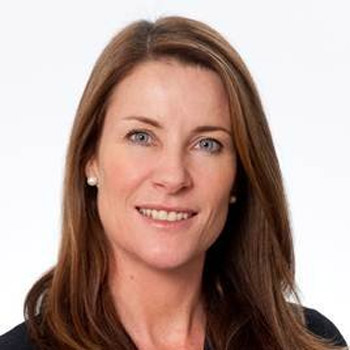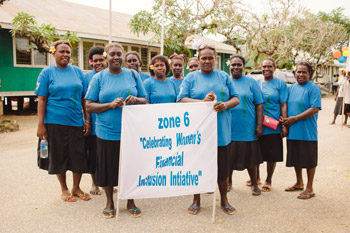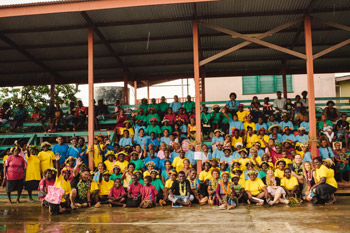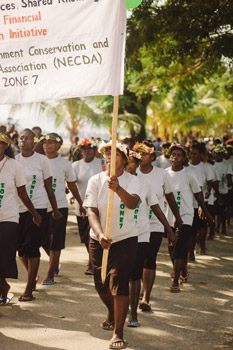Katie Saunders John West's Pacific Islands Conservation Project Interview

Katie Saunders John West's Pacific Islands Conservation Project Interview
In partnership with WWF, John West's Pacific Islands Conservation Project has already helped over 400 Solomon Island women learn new skills through a micro‐financing initiative. The project, which started in November 2013, involves training for women on managing finances, savings and loan schemes, as well as banking through finance workshops. It also involves establishing a loan scheme with the purpose of funding individually-based business ventures.
Operating in and around Ghizo Island, Solomon Islands, including communities such as Saeragi, Gizo Town and Kolombangara Island, the micro‐financing initiative has collectively banked over SBD 58,598 exceeding their target of 50,000 Solomon Islander Dollars saved by June 2014. Attendance at the educational and practical-learning based workshops has also surpassed predictions, with 400 women having taken part to date.
Dr. Andrew Smith, Marine Projects Manager WWF, has witnessed progress on the ground in the Solomon Islands. 'We have run four micro‐financing workshops and worked in the seven administrative zones for the micro-financing scheme. The women who are taking part in the training are highly appreciative of the opportunity and strongly believe the micro-financing scheme can benefit both their families and communities.
'Money saved for the micro‐financing scheme will be split between the seven zones and the first business proposals in each community will be selected and granted in July 2014, kicking off a revolving micro-lending fund." said Dr. Smith.
Driven by John West's commitment to ensuring its seafood products are responsibly sourced, the organisation has invested $600,000 over three years in the John West Conservation Program which includes a series of WWF marine conservation projects. Work in the Pacific Islands is part of this.
Kaelene McLennan, Corporate Affairs and Sustainability Manager at John West, reiterated the importance of the company's relationship with WWF in fulfilling its commitment to responsibly sourced seafood.
'Taking a cue from our sustainability commitment through Our Oceans Forever, initiatives such as the Pacific Islands Conservation Project are all about working closely with our partners, communities and suppliers to safeguard our oceans by continually improving fishing practices and conditions of fishing communities.
Meanwhile, John West is further investing in reducing bycatch by becoming a major sponsor of this year's International Smart Gear competition, which seeks and supports innovative solutions that address fisheries bycatch. The competition runs from March 1st to August 31st, 2014.
Fisheries Vice President at WWF, Bill Fox said, 'The Smart Gear competition aims to spur ideas for environmentally-friendly fishing gear that allows fishermen to fish smarter while helping to maintain ocean health. 'With the support of partners like John West, the international competition will demonstrate that conservation and industry can successfully work together to identify and eventually implement solutions to reduce bycatch," he said.
John West looks forward to seeing the innovations the competition will inspire, wh
en WWF works with each winner to bring their ideas to life, implementing them in fisheries around the world. 'John West will continue to support initiatives, globally, that work to reduce bycatch. We are proud of our partnerships with non-government organisations, government and industry to implement best practice changes that will help improve the sustainability of fisherie
s around the world," said Ms McLennan.
Guided by an overarching commitment to creating a responsible seafood supply chain, John West continues to evolve business practice to achieve their goal, a move that is supported and aided by their alliance with WWF.
For further information, visit: www.ouroceansforever.com.au
Interview with Katie Saunders, General Manager John West Australia
Question: What is the John West's Pacific Islands Conservation Project?
Katie Saunders: Tuna fans everywhere will be pleased to know that we have contributed $600,000 over three years to the John West Conservation Program, which is a series of WWF marine conservation projects that aim to create more responsibly sourced seafood. We are also working to develop sustainable fisheries to improve the livelihood of people in fishing communities and as part of this. John West is funding micro-financing projects in the Solomon Islands and Papua New Guinea.
WWF, together with Australian Aid is working with these communities to deploy small floating rafts anchored to the seafloor and close to shore, to attract different types of fish and move fishing away from the reef. This will result in fishers easily and quickly catching enough fish to feed their families and have extra to sell in the markets. The goal for the project is to get local people eager to implement the floating fishing rafts, as well as starting small businesses.
The project will also fund a scheme to help local people develop the skills and capacity to establish a small business and take advantage of catching more fish and trading the surplus. It's designed to encourage local people to save money as a first step towards taking out a small loan and particularly help women take advantage of these small business opportunities.
 Question: What will the partnership with WWF help you achieve, with this project?
Question: What will the partnership with WWF help you achieve, with this project?
Katie Saunders: Taking a cue from our sustainability commitment Our Oceans Forever, initiatives such as the Pacific Islands Conservation Project are all about working closely with our partners, communities and suppliers to safeguard our oceans by continually improving fishing practices and conditions of fishing communities.
Question: Why was it important for John West to support Solomon Islander women in build new local businesses?
Katie Saunders: We're so passionate about this project because Pacific Island communities rely heavily on the ocean as their primary source of both protein and income. With overfishing occurring, the reefs and reef fish are under enormous pressure and fast growing populations also put increasing demands on overfished reefs.
This initiative will also support Gizo women to become more independent by diversifying income streams heavily reliant on fishing. This is important because the women will not only support themselves and families but also help their communities to make more sustainable choices in the future.
Katie Saunders: The project, which started in November 2013, involves workshop training for women on managing finances, savings and loan schemes, as well as banking through finance workshops. It also involves establishing a loan scheme with the purpose of funding individually-based business ventures.
Operating in and around Gizo Island, Solomon Islands, including communities such as Saeragi, Gizo Town and Kolombangara Island, the micro-financing initiative has collectively banked over SBD 58,598 exceeding their target of 50,000 Solomon Islander Dollars saved by June 2014.
Attendance at workshops has also surpassed predictions, with 400 women having taken part to date. The women who are taking part in the training are highly appreciative of the opportunity and strongly believe the micro-financing scheme can benefit both their families and communities.
Question: What is the goal for the next six month, regarding this project?
Katie Saunders: The goal for this project is to continue to work with the women to provide training but also to support and assist with the local businesses that are set up to ensure the women's families and communities feel fully supported by the scheme.
Question: Can you talk us through the 'micro-lending phase of the project" that will be launched at the formal event in Ghizo?
Katie Saunders: Money saved for the micro-financing scheme will be split between the seven Gizo zones and the first business proposals in each community will be selected and granted in July 2014, kicking off a revolving micro-lending fund. r
Question: What have you enjoyed most about working on this project?
Katie Saunders: On a personal level, it's fantastic to be able to empower these women and communities with tools to help support themselves, families and communities and we look forward to the continued success.
 Question: Can you talk us through the International Smart Gear competition?
Question: Can you talk us through the International Smart Gear competition? Katie Saunders: The Smart Gear competition is a great platform to spark some creativity amongst Environmental Entrepreneurs. Sponsored by John West, it's an international competition, which aims to spur ideas for environmentally friendly fishing gear that allows fishermen to fish smarter while helping to maintain ocean health.
This is a great way to demonstrate that conservation and industry can successfully work together to identify and eventually implement solutions. We're hopeful that the solutions will reduce bycatch and we're certainly excited to see the innovations the competition will inspire.
Question: How can Australians help support this project?
Katie Saunders: For a more sustainable seafood future, Aussies can do the following:
Purchase sustainable seafood that meets the MSC standard by looking for the distinctive blue MSC eco-label. This gives you a simple way to identify and purchase fish from sustainable sources.
Measure your personal ecological footprint with WWF's footprint calculator. WWF's ecological footprint calculator will work out your personal footprint, based on the way you live your life today – such as what you eat, where you live, how you travel, the amount of energy that you use. Knowing your ecological footprint will enable you to make informed choices that will help you to reduce your impact on the planet. Find it here http://www.wwf.org.au/what_you_can_do/change_the_way_you_live/sustainable_living/
For more information, please visit www.ouroceansforever.com.au
Interview by Brooke Hunter
MORE
- The Smith Family Winter Appeal 2013
- Dr Elise Bialylew Mindful In May – Sit for...
- Cotton On Foundation
- Louise Mahoney Dreams2live4Interview
- Monique Dews and Jo Hayes Girls' Night In...
- Mandy Richards Global Sisters Interview
- Wendy Robinson Camp Quality Dine at Mine Interview
- Felicity Wever UNICEF and Domestos Interview
- Tania de Jong Sing for Good 2016 Interview
- Jill Green Red Nose Day 2016 Interview
- Sally Obermeder Jeans for Genes Day Interview
- Team Charlie Run2Cure Children's Cancer Interview
- Janelle Bloom Australia's Biggest Morning Tea...
- Conan Visser ICANIWILL Children's Charity...
- Jane Kennedy 2016 A Taste of Harmony Campaign...
- Jessica Brown Life Changing Experiences...
- AKP Literacy Program Launched in Kenya
- Kate MClennan Pink Ribbon Day Interview
- Foodbank Fighting for Australians in Need
- Orange Sky Laundry
- Marta Dusseldorp World Refugee Day Interview




